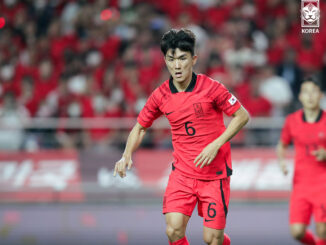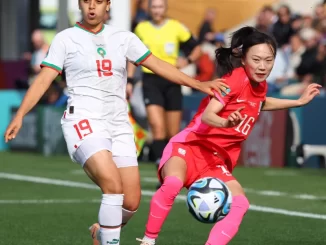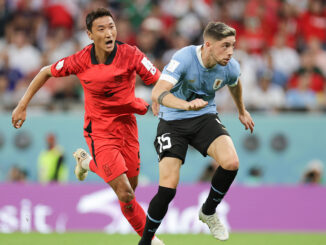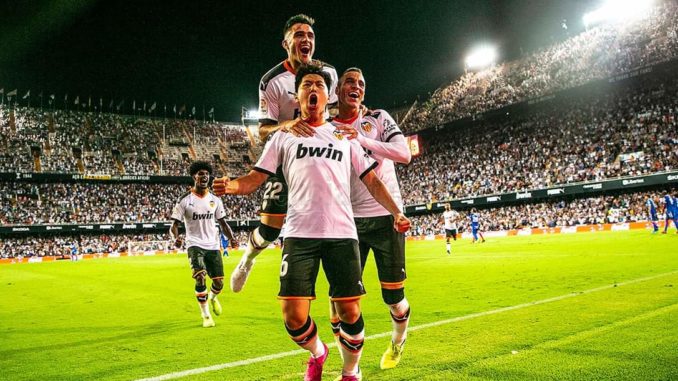
It doesn’t take much for a young player to get hyped up in the social media age.
A few fancy step overs, a few nice goals and the twittersphere is abuzz about the ‘next big thing’, so much so that its easy for genuine talents to get lost in the never-ending stream of hype.
This is especially the case in Asia.
There has been a seemingly endless stream of ‘next big things’ from the world’s biggest continent over the years, so much so that talk of future talent becomes a little like The Boy Who Cried Wolf.
But a pair of 18-year-olds in Spain’s La Liga, perhaps, are about to buck that trend.
Takefusa Kubo (RCD Mallorca, on loan from Real Madrid) and Lee Kang-in (Valencia) are the real deal, at least according to those who nurtured their talent from a young age.
“Regardless of the reasons why FC Barcelona did not recover Take, I do believe it has been a major mistake on the part of the club.“
Former La Masia academy director, Joan Vilà
Joan Vilà is the former head of La Masia, FC Barcelona’s famed academy, where Takefusa Kubo emerged as one of the most exciting talents in recent times.
“I can say that from the first moment I detected that in Take we had a future great player,” Vilà told The Asian Game.
“In fact, I could see it when I first saw it in Japan in a camp of young soccer players that I attended as a coach.
“He is very intelligent, with great confidence in himself and his possibilities. In fact, in every situation throughout the game (he) demonstrates this confidence.
“For several years he is playing and competing in categories above his age and facing players older than him, and (he) has remained a prominent player in his performances.”
That was the case too for Luis Vicente Mateo, the former academy director of Valencia. Mateo started working at the Valencia academy in 2013, before becoming academy director in 2017, and was instantly impressed by the then 12-year-old Lee.
“First of all when I saw Kang-in in 2013, he played in the under-13s,” Mateo, now academy director at Israeli side Maccabi Haifa, told The Asian Game.
“His character and competitiveness was a surprise (to me). He had talent, but his effort each training and game was amazing. He was the best player for sure.”
Lee and Kubo have been hyped for a number of years now, especially Kubo who starred at La Masia, but that also comes with plenty of risk. So often prodigious young talent doesn’t translate into success at senior level, and we’ve seen that time and again with Asian players in the past.
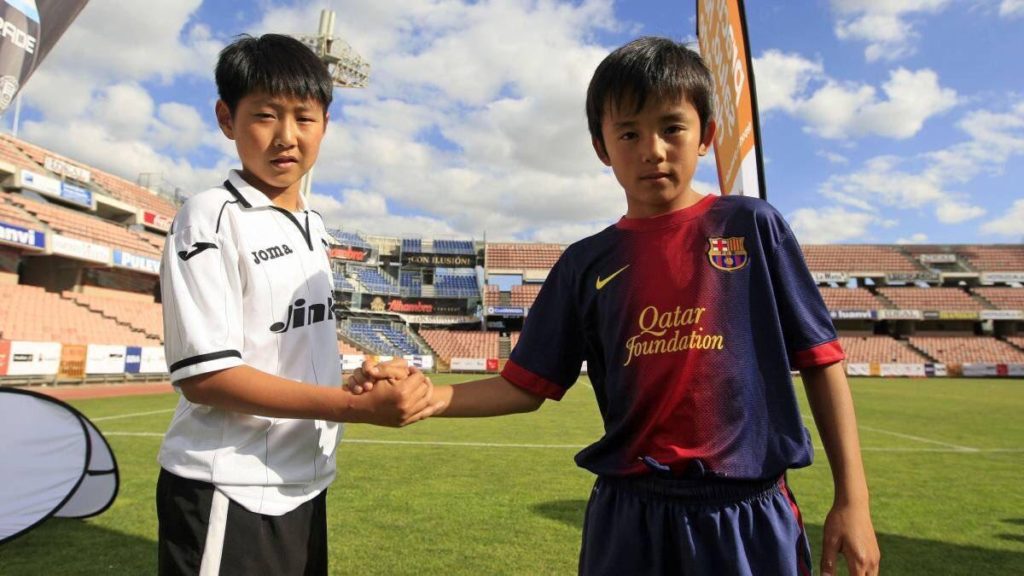
Just a few years before Kubo, South Korean starlet Lee Seung-woo was similarly hyped as the “Korean Messi” for his exploits with the Barcelona youth teams.
While he is still only 21, he has struggled to translate that prodigious talent into anything substantial at senior level. A move to Serie A side Hellas Verona didn’t deliver as expected, and he is now on the books of Belgian side Sint-Truiden, where he is equally struggling for consistent game time.
Fans in both countries, but particularly those in South Korea, are very demanding and once the hype train has left the station it can be hard to stop. Often players are fast tracked into senior national teams before they are ready and being able to deal with that pressure and expectation is what sets players apart.
Lee Seung-woo isn’t the only one to suffer such a fate.
In South Korea as well there has been Paik Seung-ho (also from Barcelona’s La Masia) and Jeong Woo-yeong (Bayern Munich) who have had this pressure applied to them from a young age.
Paik is now at 2.Bundesliga side Darmstadt 98, while Jeong is with SC Freiburg, although he has yet to make a senior appearance.
“I definitely think that such a pressure has more potential harm than good,” Korean journalist Steve Han told The Asian Game.
“Even for me, personally as a football writer, it’s difficult sometimes to draw the line when working on a story related to Lee Kang-in, as any story centering on him is almost guaranteed to draw so many hits.
“But at the same time, I’m trying to strike that balance between reporting information that matters and simply churning out a story that does nothing else other than contribute to an already lofty expectations on such a young player for the sake of drawing traffic to our site.”
So far, however, both Kubo and Lee have shown they are more than capable of handling the pressure. In fact, they seem to be thriving on it.
Last year Lee was instrumental in guiding South Korea to the final of the FIFA U20 World Cup in Poland, winning the ‘Golden Ball’ as the tournament’s best player.
According to Han, far from adding extra burden, the individual accolade was actually a good thing for Lee, who was born in Incheon and was first discovered as a seven year-old on the popular Korean television show ‘Shoot Dori’.
“I think it was actually a relief that he won a personal accolade at his very first major international tournament, mainly because it validated some of the expectations,” the US-based Han, who writes for Goal.com, said.
“But it’s also true that the “Golden Ball winner” label could start to work against him if and when his development stalls within the next three to four years.
“No other Korean player has garnered this much praise and attention on a global scale and the Golden Ball at the U-20 World Cup has certainly raised his profile further even before he completed a full season as a first teamer at Valencia.”
Despite his tender age, Valencia knew they had a potential star on their hands, signing him to a five-year deal in July 2017, with a release clause of €80m, before upgrading him to the senior squad in January 2019.
Making his debut on 12 January 2019, at just 17 years, 10 months and 24 days, he become the youngest ever non-Spanish player to play in La Liga.
This has been an interrupted season for Lee, with injury and suspension keeping him sidelined for large chunks of the season, but with a change of coach at Valencia, his opportunities have increased under Albert Celades. In September he scored his first goal in a 3-3 draw with Getafe.
“In my personal opinion, he has big potential in the future,” Mateo explained. “Because he is the kind of player that today is difficult find – he has talent, (he can) shoot, dribbling, character, and overall he is hungry to compete, doesn’t matter the opponent or the game.”
For all the success Lee has had, and is having, the excitement around Kubo exceeds that surrounding the Korean.
The teenager was caught up in the scandal that engulfed Barcelona and their signing of players under the age of 18, which meant Kubo had to leave La Masia, finding his way back home to join FC Tokyo.
Initially playing for the club’s U23 side in J3, the third-tier of the Japanese football system, he made his debut for the senior side in February 2017 as a 15-year-old.
According to his old mentor, Joan Vilà, the forced return to Japan might actually have been a blessing in disguise.
“The fact that Take had to leave FC Barcelona due to a FIFA sanction for me was a blow because I saw that the projection he had in the club could be truncated,” the esteemed youth development guru said.
“I think that in principle it was a setback and a shame for the club and for the player, but the fact that during these four years he has been able to play at a more professional level in Japan has made him mature and ultimately benefited him.
“We don’t know what would have happened if he hadn’t had to go to Japan, but as I said, possibly all this has helped him grow as a footballer.”
Certainly that was the case last season as Kubo, despite being just 17, led FC Tokyo to their best ever start to the J.League with four goals in 13 matches as FC Tokyo opened up a handy lead on top of the table.
But it was always expected that as soon as he turned 18 – and could therefore legally sign for a club in Europe – he would depart the club, and no sooner had he blown out the candles, he was Europe-bound, which was the beginning of the end for FC Tokyo.
But his destination came as a big surprise.
Many had expected a deal was in place for his return to Barcelona, but instead he was snapped up by their biggest rivals, Real Madrid, in a move that made headlines the world over.
According to Vilà, it was a huge mistake from the Catalan giants to not bring him back to the Camp Nou.
“I was surprised that FC Barcelona did not recover Take when he turned 18,” he admitted.
“I don’t know the real reasons for this situation, but I can say that I felt very disappointed since I had, and still have, great confidence in his professional future and I would have liked this future to be at Barça.
“When I learned about his signing for Real Madrid, I called him to congratulate him and wish him the best, since in addition to a professional relationship, above all we have a very close personal relationship with him and his family. I wish him to succeed and I know it will be that way, but I would have liked it to be at FC Barcelona.
“In my club I want the best players to be there, and Take is (one of the best players). Therefore, regardless of the reasons why FC Barcelona did not recover Take, I do believe it has been a major mistake on the part of the club.”
While he took part in Madrid’s pre-season, it came as no surprise when he was loaned out to RCD Mallorca and the move has been a good one for him, allowing him to get regular game time and come to grips with life in Spain’s top division.
Sid Lowe is one of the most respected voices on the Spanish game, and he spoke to The Asian Game podcast last year about Kubo’s move to the Spanish capital.
“When Kubo signed, yeah it was a surprise,” he explained.
“There was a sense of frustration I think from Barcelona fans that this was a guy that they thought was going to be really good, and only left the club because Barcelona were punished because of the signing of players like him.
“There was then a question of ‘well how good is he?‘ and pretty early people are starting to say ‘yeah, he’s genuinely quite good.’
“If you look at him, he looks like what he is, which is a kid. He looks very young, he looks very slight, but then he gets on the ball and he’s tough. Apart from the obvious skill and talent, he’s tough.
“He’s a guy that holds onto the ball. He withstands challenges well, he’s got a view of the game and a perspective and creativity that I think is lacking from Mallorca.”
Whether he stays at Mallorca beyond this season remains to be seen, with reports emerging recently in Spain that Real Madrid want him to play at a higher level and have identified him as a replacement for Martin Ødegaard at Real Sociedad, with Ødegaard, himself a youth prodigy signed by Real Madrid in 2015, looking likely to return to the Bernabéu on a permanent basis.
Will Kubo follow suit one day and also return to the Bernabéu to pull on Madrid’s famous white kit?
“Take is and will be a great player,” Vilà said.
“He will play in a big team, sure. I don’t know if it will be at Real Madrid, but there will be a lot of talk about this excellent player. I am sure that he will mark the era in the coming years as one of the best players worldwide.”
Lowe explained further the difficulties he will face breaking into the Real Madrid first team.
“I think Madrid’s plans for him are as they are for most kids, I don’t think they’re any different for Take as they are for everyone else,” he explained.
“Madrid over the last six or seven years have had a very clear policy, which is to buy the best young players, largely at Spanish clubs but also from around the world.
“This is the slight problem for Real Madrid, (because) you buy these players and then there is a bottleneck to the first team. In an ideal world, from a Real Madrid point of view, he goes to Mallorca, he’s absolutely brilliant, he comes back next year and goes straight into the first team.
“Of course the difference is at Real Madrid there are so many good players ahead of them that getting into the first team is very difficult.”
That is for another day, however, for now let’s just appreciate that a pair of 18-year-olds from Asia are emerging as two of the brightest prospects in one of the world’s biggest and best leagues.
Photo: Valencia CF Facebook
Listen to Sid Lowe talk about two of Asia’s most promising talents on Episode 42 of The Asian Game podcast.


